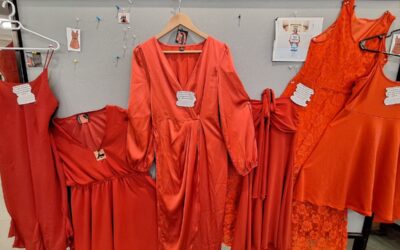By A.Jade Munsie
Writing exams are stressful. The pressure to succeed, to pass, lays heavy on the shoulders of students as is, but what if there was more to it than just writing an exam? What if when you entered the classroom, everyone stopped and stared. When you sit down, the professor tells you that you can’t write the exam unless you remove a part of who you are and what you believe.
That’s The Final Exam.

A Mosquers Film Festival finalist, The Final Exam is a beautiful and ultimately tragic story about doing what’s suitable for someone else. Based on the experience of co-director Ibrahim Cin, the story follows a young Muslim woman told to remove her headscarf to write an exam and the act of a young man that makes way for her to do so, though consequences loom.
“I said, ‘My gosh that would make an amazing short film,’ and that’s when he said, ‘Will you make it with me?’” said co-director Beth Wishart Mackenzie of her interaction with Ibrahim after hearing his experience.
Beth Wishart MacKenzie and Ibrahim Cin come together to tell a story that raises the question: Can we take ownership and accountability for the treatment of others?
As MacKenzie refers to it, the story is an actual moment, “a collective act of compassion.”
The film is the first collaboration between MacKenzie and Cin. MacKenzie has a history in Comparative Religious Studies and teaching world religion and Hebrew scriptures at the University of Alberta before dipping her toes into filmmaking. While Cin, who was involved in film and television at NAIT, is an emerging Turkish filmmaker, making his co-directing, co-writing and co-producing debut with this film.
Shot on location, MacKenzie and Cin tell an authentic Turkish story from a classroom in Edmonton’s NAIT–a set that fits perfectly for the recreation of how Cin remembers things.
“It was the exact layout that we had the incident,” said Cin.
However, NAIT wasn’t the original plan. Shortly before filming began, the original location had fallen through, and MacKenzie and Cin had no other prospects.
“Alison Lewis (Vice-President of Student Affairs at NAIT) rescued the production. We were going to have to pull the plug, we had lost our location, and it worked so perfectly,” said MacKenzie.
Pre-production began on the short film in mid-summer of 2019, and filming started in October of that year. With a crew of mainly Muslim Edmonton locals, aside from two actors from Calgary, The Final Exam was filmed over three days and the crew celebrates the dedication it to make it the positive experience it was.
“It was phenomenal. We had such a good time and learned so much about the process, and we found in the end that the crew we had just lifted us up,” said MacKenzie.
The film was a learning experience for both MacKenzie and Cin, but the result was better than they imagined.
“The Final Exam is based on Ibrahim’s personal experience, and we did all we could from the bottom up because I had done documentary but had never done a dramatic narrative, and neither had Ibrahim,” said MacKenzie.
“I think there were times in the movie that I felt it was even better than the original story that I had in the real-life,” said Cin.
The 11-minute film takes place in 1998 Turkey, during the implementation of a law revoking the right for individuals to wear religious attire in public institutions–a law that impacted both men and women of faith and dampened the freedom of human choice.
“Thousands of people left the country during that time because their education [was] literally banned, because they want[ed] to practice their religion, they want[ed] to practice wearing headscarf. Thousands didn’t have the means. They didn’t have enough money to go out of the country to pursue their goals,” said Cin.
Though set in 1998, Turkey, the story is close to home. In 2019, Quebec introduced Bill 21 that represses people’s right to wear religious attire. However, it contends with the Canadian Charter of Rights and Freedoms.
“[Bill 21] has impacted Muslim women in Quebec who have lost their jobs or who have not been able to advance their careers because they wear the headscarf,” said MacKenzie. “What I saw in Ibrahim’s story was in some sense a parallel to what I see taking place in Canada.”
“We should know and be aware of these situations to know the value of the rights that we have here, and perhaps we are going to become more appreciative after watching the movie. Someone who sees the situation can be more appreciative of what we have here and preserve it and keep it going,” said Cin.
The film is an ode to what we have, what we can do, and how we treat others. And what it means to stand up and take a chance.
“This film, we hope, will open up conversation on multiple levels–looking at what religious freedom means in a secular state, or a multicultural state, but also the challenge these sort of questions have for feminists, and how we go forward as a community that welcomes people from around the world. How do we make this place feel like home?” said MacKenzie.
After screening the film at festivals, MacKenzie and Cin hope to bring The Final Exam to university communities and NAIT, specifically, along with a panel discussion to start conversations within a student-based institution and create engagement within Islamic societies.





